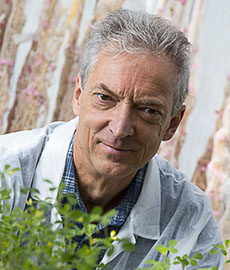IMS Vice-President Candidates for 2017-2019
Guillaume Bécard
Professor of Plant Physiology at the University of Toulouse III/CNRS
Lead Scientist of the Endomycorrhizal Symbiosis and Cell Signaling group
Laboratory of Research in Plant Sciences (LRSV)

Guillaume Bécard CV and Interests
Laboratory of Research in Plant Sciences (LRSV), University of Toulouse III/CNRS
24, chemin de Borde-Rouge, 31326 Castanet Tolosan
Tel: (33) 534323820; (33) 680540106; becard@lrsv.ups-tlse.fr
http://www.lrsv.ups-tlse.fr/; https://www.fraib.fr/
Personal
French citizenship.
Born July 1958, Tours, France.
Married, four children.
Present status
-Professor of Plant Physiology at the University of Toulouse III
-Lead Scientist of the Endomycorrhizal Symbiosis and Cell Signaling group (LRSV)
Education
-Ph.D. Plant Microbiology, Laval University, Quebec, Canada, 1985-1989.
-Undergraduate studies in Chemistry-Biochemistry and Genetics, University of Paris VI, France, 1977-1982.
I am interested in the cellular and molecular mechanisms involved in the establishment of the arbuscular mycorrhizal symbiosis: from spore germination to the formation of arbuscules. I study both the fungal partner and the plant partner for an integrated view of these mechanisms. I believe that the study of this ancient symbiosis can lead to the discovery of ancestral mechanisms governing the development of plants and their interactions with microorganisms. My research also aims to promote the use of AM fungi in sustainable agriculture and thus reduce the need for irrigation and chemical inputs.
List of publications (last 6 years)
Bécard G (Ed.) (2017) How Plants Communicate with their Biotic Environment, Advances in Botanical Research, Vol 82, 1st Edition, Academic Press, 404 pages
Bécard G & Puech-Pagès V (2017) Communication entre les partenaires dans la symbiose mycorhizienne à arbuscules, in “Les sols et la vie souterraine” – Des enjeux majeurs en agroécologie. J.-F. Briat & D. Job (Coord.), Quae, 328 pages
Bécard G, Guidi L, Alizon S, Angelier F, Bezin L, Bowler C, Courchamp F, Dutreuil S, Faure M, Hibner U, Jebbar M, Kaltz O, Leulier F, Loudet O, Simonet P, Tost J, Vergnolle N (2017) L’être vivant dans son environnement, in “Étonnant vivant – Découvertes et promesses du XXIe siècle”, C. Jessus & T. Gaude (Eds.), CNRS Edition, 328 pages
Gough C & Bécard G (2016) Strigolactones and lipochitooligosaccharides as molecular communication signals in the arbuscular mycorrhizal symbiosis, in “Molecular Mycorrhizal Symbiosis”, F. Martin (Ed.), Wiley-Blackwell, 576 pages
Couzigou JM, Lauressergues D, André O, Gutjahr C, Guillotin B, Bécard G, Combier JP (2017) Positive Gene Regulation by a Natural Protective miRNA Enables Arbuscular Mycorrhizal Symbiosis. Cell Host Microbe. 21: 106-112
Tang N, San Clemente H, Roy S, Bécard G, Zhao B, Roux C (2017) A Survey of the Gene Repertoire of Gigaspora rosea Unravels Conserved Features among Glomeromycota for Obligate Biotrophy. Front Microbiol. 2016 Mar 1 ;7:233.
Guillotin B, Etemadi M, Audran C, Bouzayen M, Bécard G, Combier J-P (2016). Sl-IAA27 regulates strigolactone biosynthesis and mycorrhization in Tomato (var. MicroTom). New Phytol. 213: 1124-1132
Couzigou JM, Lauressergues D, Bécard G, Combier JP. (2015). miRNA-encoded peptides (miPEPs): A new tool to analyze the roles of miRNAs in plant biology. RNA Biol., 12(11): 1178-80
Lauressergues D, Couzigou J-M, San Clemente H, Martinez Y, Dunand C, Bécard G, Combier J-P (2015). Primary transcripts of microRNAs encode regulatory peptides. Nature, 520 :90-3
Etemadi M*, Gutjahr C*, Couzigou JM, Zouine M, Lauressergues D, Timmers A, Audran C, Bouzayen M, Bécard G, Combier JP (2014). Auxin perception is required for arbuscule development in arbuscular mycorrhizal symbiosis. Plant Physiol., 114.246595
Laparre J*, Malbreil M*, Letisse F, Portais JC, Roux C, Bécard G, Puech-Pagès V. (2014). Combining metabolomics and gene expression analysis reveals that propionyl- and butyryl-carnitines are involved in late stages of arbuscular mycorrhizal symbiosis. Mol. Plant, 7: 554-566
Tisserant E*, Malbreil M*, Kuo A, Kohler A, Symeonidi A, Balestrini R, Charron P, Duensing N, Frei Dit Frey N, Gianinazzi-Pearson V, Gilbert LB, Handa Y, Herr JR, Hijri M, Koul R, Kawaguchi M, Krajinski F, Lammers PJ, Masclaux FG, Murat C, Morin E, Ndikumana S, Pagni M, Petitpierre D, Requena N, Rosikiewicz P, Riley R, Saito K, San Clemente H, Shapiro H, van Tuinen D, Bécard G, Bonfante P, Paszkowski U, Shachar-Hill YY, Tuskan GA, Young PW, Sanders IR, Henrissat B, Rensing SA, Grigoriev IV, Corradi N, Roux C, Martin F. (2013). Genome of an arbuscular mycorrhizal fungus provides insight into the oldest plant symbiosis. Proc Natl Acad Sci U S A., 110(50): 20117-22
Balzergue C, Chabaud M, Barker DG, Bécard G, Rochange SF. (2013). High phosphate reduces host ability to develop arbuscular mycorrhizal symbiosis without affecting root calcium spiking responses to the fungus. Front. Plant Sci., 4:426
Delaux PM, Bécard G, Combier JP. (2013). NSP1 is a component of the Myc signaling pathway. New Phytol., 199(1): 59-65
Delaux PM, Séjalon-Delmas N, Bécard G, Ané JM. (2013). Evolution of the plant – microbe symbiotic “toolkit”. Trends Plant Sci., 18: 298-204
Genre A, Chabaud M, Balzergue B, Puech-Pages V, Novero M, Rey T, Fournier J, Rochange S, Bécard G, Bonfante P, Barker DG. (2012). Short-chain chitin oligomers from arbuscular mycorrhizal fungi trigger nuclear Ca2+ spiking in Medicago truncatula roots and their production is enhanced by strigolactone. New Phytol., 198(1):190-202
Louarn J, Carbonne F, Delavault P, Bécard G, Rochange S. (2012) Reduced germination of Orobanche cumana seeds in the presence of arbuscular mycorrhizal fungi or their exudates. PLoS ONE, 7(11): e49273.doi:10.1371/journal.pone.0049273
Formey D*, Molès M*, Haouy A, Savelli B, Bouchez O, Bécard G and Roux C (2012) Comparative analysis of mitochondrial genomes of Rhizophagus irregularis – syn. Glomus irregulare – reveals a polymorphism induced by variability generating elements. New Phytol., 196(4):1217-27
Lauressergues* D, Delaux* P-M, Formey D, Lelandais-Brière C, Fort S, Cottaz S, Bécard G, Niebel A, Roux C and Combier J-P. (2012). The microRNA miR171h modulates arbuscular mycorrhizal colonization of Medicago truncatula by targeting NSP2. Plant J., 72(3):512-522
Delaux PM, Xi X, Timme RE, Puech-Pages V, Dunand D, Lecompte E, Delwiche CF, Yoneyama K, Bécard G and Séjalon-Delmas N. (2012). Origin of strigolactones in the green lineage. New Phytol., 195(4):857-71
Tisserant E, Kohler A, Dozolme-Seddas P, Balestrini R, Benabdellah K, Colard A, Croll D, Da Silva C, Gomez SK, Koul R, Ferrol N, Fiorilli V, Formey D, Franken P, Helber N, Hijri M, Lanfranco L, Lindquist E, Liu Y, Malbreil M, Morin E, Poulain J, Shapiro H, van Tuinen D, Waschke A, Azcón-Aguilar C, Bécard G, Bonfante P, Harrison MJ, Küster H, Lammers P, Paszkowski U, Requena N, Rensing SA, Roux C, Sanders IR, Shachar-Hill Y, Tuskan G, Young JPW, Gianinazzi-Pearson V and Martin F. (2011). The transcriptome of the arbuscular mycorrhizal fungus Glomus intraradices (DAOM 197198) reveals functional tradeoffs in an obligate symbiont. New Phytol., 193(3):755-69
Koltai H, Cohen M, Chesin O, Mayzlish-Gati E, Bécard G, Puech V, Ben Dor B, Resnick N, Wininger S, Kapulnik Y. (2011) Light is a positive regulator of strigolactone levels in tomato roots. J. Plant Physiol., 168(16):1993-6
Laparre J, Balzergue C, Rochange S, Ludwiczak P, Letisse F, Portais JC, Bécard G, Puech-Pages V. (2011) Metabolite profiling of pea roots in response to phosphate availability. Plant Signal. Behavior, 6: 837-9
Kapulnik* Y, Delaux* PM, Resnick N, Mayzlish-Gati E, Wininger S, Bhattacharya C, Séjalon-Delmas N, Combier JC, Bécard G, Belausov E, Beeckman T, Dor E, Hershenhorn J, Koltai H. (2011) Strigolactones affect lateral root formation and root hair elongation in Arabidopsis. Planta, 233(1):209-16
Maillet F, Poinsot V, André O, Puech-Pagès V, Haouy A, Gueunier M, Cromer L, Giraudet D, Formey D, Niebel A, Andres Martinez E, Driguez H, Bécard G, Dénarié J. (2011) Fungal lipochitooligosaccharidic symbiotic signals in arbuscular mycorrhiza. Nature, 469: 58-63
Balzergue C, Puech-Pagès V, Bécard G, Rochange S. (2011) The regulation of arbuscular mycorrhizal symbiosis by phosphate in pea involves early and systemic signalling events. J. Exp. Bot., 62: 1049-60
John Klironomos, PhD, FRSC
Professor, Department of Biology
University of British Columbia (Okanagan campus)
Kelowna, BC, Canada

John Klironomos CV and Interests
Professor
Department of Biology
University of British Columbia (Okanagan campus) Kelowna, BC, Canada
E-mail: john.klironomos@ubc.ca
Current Research Interests
The ecology of mycorrhizal symbioses; Mycorrhizas and plant invasions; The influence of soil biota on plant communities.
| Education | ||
| 1994 | Ph.D. Biology | University of Waterloo |
| 1990 | B.Sc. Biology | Concordia University |
Academic Positions held
2009- Professor of Biology, UBC
2017- Member, Board of Governors, UBC
2017- Associate Head, Department of Biology, UBC
2013-2015 Associate Dean Research, Arts and Sciences, UBC 2006-2009 Professor, University of Guelph
2001-2006 Associate Professor, University of Guelph 1996-2001 Assistant Professor, University of Guelph
1994-1996 Postdoctoral Fellow, San Diego State University
Current Editorial Position
Editor Ecology Letters
Selected Undergraduate Courses Taught
Advanced Field Ecology, Conservation Biology, Evolutionary Ecology Introductory Ecology, Mycology, Plant Ecology, Restoration Ecology, Microbial Ecology
Selected Graduate Courses Taught
Plant Ecology, Advances in Ecology and Behaviour
Awards and Distinctions
2014 Fellow of the Royal Society of Canada, Academy of Science 2013 Fellow of the AAAS
2013 Professional Achievement Award, Soil Ecology Society 2007 Humboldt Research Award, Humboldt Foundation, Germany 2006 E.W.R. Steacie Research Fellowship, NSERC, Canada 2003 Charles Bullard Fellowship, Harvard University, U.S.A.
2003 Canada Research Chair, Tier II, Canada
2001 President’s Distinguished Professor Award, University of Guelph 2000 Ontario Premier’s Research Excellence Award
Current Research Society Positions and Memberships
Fellow, Royal Society of Canada
Member, Canadian Society for Ecology and Evolution Member, International Mycorrhiza Society
Member, Soil Ecology Society (President 2010-2011)
Selected Publications (158 total)
Van der Heijden, M.G.A., Klironomos, J.N., Ursic, M., Moutoglis, P., Streitwolf- Engel, R., Boller, T., Wiemken, A., Sanders, I.R. (1998) Mycorrhizal fungal diversity determines plant biodiversity, ecosystem variability and productivity. Nature 396, 69-72.
Klironomos, J.N. and Hart, M.M (2001) Animal nitrogen swap for plant carbon.
Nature 410, 651-652.
Klironomos, J.N. (2002) Feedback with soil biota contributes to plant rarity and invasiveness in communities. Nature 417, 67-70.
Klironomos, J.N. (2002) Another form of bias in conservation research. Science
298, 749.
Wardle, D., Bardgett, R., Klironomos, J. Setälä, H., Van der Putten, W., Wall, D. (2004). Ecological linkages between aboveground and belowground biota. Science 304, 1629-1633.
Klironomos, J.N., Allen, M.F., Rillig, M.C., Piotrowski, J., Makvandi-Nejad, S., Wolfe, B.E., and Powell, J.R. (2005) Abrupt rise in atmospheric CO2 overestimates community response in a model plant-soil system. Nature 433, 621-624.
Maherali H and Klironomos JN (2007) Influence of phylogeny on fungal community assembly and ecosystem functioning. Science 316, 1746-1748.
Pringle A, Bever JD, Gardes M, Parrent JL, Rillig MC, Klironomos JN (2009) Mycorrhizal symbioses and plant invasions. Annual Review of Ecology, Evolution and Systematics 40, 699-715.
Chagnon P-L, Bradley RL, Maherali H, Klironomos JN (2013) A trait-based framework to understand life history of mycorrhizal fungi. Trends in Plant Science 18, 484-491.
Fraser LH, Pither J, Jentsch A, Sternberg M, Zobel M, et al. (2015) Worldwide evidence of a unimodal relationship between productivity and plant species richness. Science 349, 302-305.
Bennett JA, Maherali H, Reinhart KO, Lekberg Y, Hart MM, Klironomos J (2017) Plant-soil feedbacks and mycorrhizal type influence temperate forest population dynamics. Science 355, 181-184.
